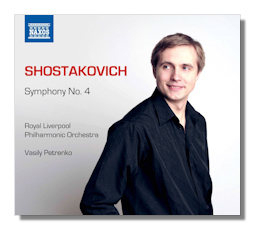
The Internet's Premier Classical Music Source
Related Links
- Shostakovich Reviews
- Latest Reviews
- More Reviews
-
By Composer
-
Collections
DVD & Blu-ray
Books
Concert Reviews
Articles/Interviews
Software
Audio
Search Amazon
Recommended Links
Site News
 CD Review
CD Review
Dmitri Shostakovich

Symphony #4 in C minor, Op. 43
Royal Liverpool Philharmonic Orchestra/Vasily Petrenko
Naxos 8.573188 65m
The Shostakovich 4th Symphony is one of those unique works in musical literature: you can't really determine whether it is happy or sad, angry or schizophrenic, musically pioneering or a combination of these. Over the decades those varied descriptions have been ascribed to this puzzling and quite individual work. What has partly clouded the issue regarding the 4th Symphony was its delayed premiere: written in 1936 it was wisely held back by the composer for fear it would land him in great jeopardy with the cultural Tsars in the Soviet Union. I say "wisely" because the climate for the arts in the USSR had taken an oppressive turn for the worse in 1936, the year a disgruntled Stalin walked out of a performance of Shostakovich's opera Lady Macbeth of the Mtsensk District, which resulted in a Pravda editorial denouncing the work as "muddle instead of music". At any rate, the symphony was not premiered until 1961, eight years after Stalin's death and at a time when there was a bit more freedom in Soviet art. Naturally, the symphony did not sound as modern then as it would have in 1936. Kirill Kondrashin made a splendid recording of the work for Melodiya in 1962 and Eugene Ormandy for Columbia in 1963. These may arguably still be the two performances to beat in this work. So, how does young Vasily Petrenko do in comparison?
Petrenko has now recorded all the Shostakovich symphonies for Naxos except for #13 and 14. Generally he has received high praise from critics, including from me in reviews of #2 and 15 (Naxos 8.572708), 6 and 12 (Naxos 8.572658), 7 (Naxos 8.573057), 8 (Naxos 8.572392), and 10 (Naxos 8.572461). This performance of the hour-plus, three-movement 4th may well be the best in Petrenko's cycle thus far: he draws crisp, lively and accurate playing from his Liverpool orchestra, often bringing out meaningful elements of orchestration buried in other performances. Most importantly, he suggests answers to the puzzle raised in the first paragraph about the work: he sees this symphony primarily as a humorous and sarcastic work, with a madcap kind of demeanor. There's more slapstick in this reading than I've heard in any other performance: try the playful but acid-drenched episode beginning at 13:29 in the finale, where there's a manic glee in the busy work of the xylophone and later on an oafish clowning both from the trombone and clarinet. But all is not humor and fun in this interpretation: the closing episode is crushing in its power and proud defiance. This music of course eventually gives way to a quiet and mysterious ending, but one that does not suggest tragedy or loss.
The first movement's opening march, which in other performances can have a stiff or business-like manner, comes across here with a biting sarcasm and faux pomposity in its antiseptic crispness and motoric bounce. The quieter music in the middle of the movement is always well played and atmospheric, not least because Petrenko's deft sense for dynamics and the splendid playing by the Liverpool winds. The strings turn on the virtuosity in the racing passage beginning at 15:23; the pacing is breathless and the inner voices emerge clearly and with a driving menace that brings on a climax of percussion and brass that suggests something of a musical Armageddon. All would seem dead serious here except for those playful xylophone glissandos, which are played with extra relish. All in all, this is a spectacular recording on all counts and goes to the top of my list. Naxos provides vivid and powerful sound reproduction. Need I say – highest recommendations!
Copyright © 2013, Robert Cummings


















